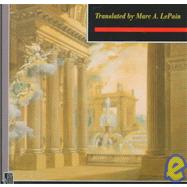- ISBN: 9780691050256 | 0691050252
- Cover: Paperback
- Copyright: 4/17/2000
The "City of God" or the "City of Man"? This is the choice St. Augustine offered 1500 years ago--and according to Pierre Manent the modern West has decisively and irreversibly chosen the latter. In this subtle and wide-ranging book on the Western intellectual and political condition, Manent argues that the West has rejected the laws of God and of nature in a quest for human autonomy. But in declaring ourselves free and autonomous, he contends, we have, paradoxically, lost a sense of what it means to be human. In the first part of the book, Manent explores the development of the social sciences since the seventeenth century, portraying their growth as a sign of increasing human "self-consciousness." But as social scientists have sought to free us from the intellectual confines of the ancient world, he writes, they have embraced modes of analysis--economic, sociological, and historical--that treat only narrow aspects of the human condition and portray individuals as helpless victims of impersonal forces. As a result, we have lost all sense of human agency and of the unified human subject at the center of intellectual study. Politics and culture have come to be seen as mere foam on the tides of historical and social necessity. In the second half of the book, titled "Self-Affirmation," Manent examines how the West, having discovered freedom, then discovered arbitrary will and its dangers. With no shared touchstones or conceptions of virtue, for example, we have found it increasingly hard to communicate with each other. This is a striking contrast to the past, he writes, when even traditions as different as the Classical and the Christian held many of these conceptions in common. The result of these discoveries, according to Manent, is the disturbing rootlessness that characterizes our time. By gaining autonomy from external authority, we have lost a sense of what we are. In "giving birth" to ourselves, we have abandoned that which alone can nurture and sustain us. With penetrating insight and remarkable erudition, Manent offers a profound analysis of the confusions and contradictions at the heart of the modern condition.






